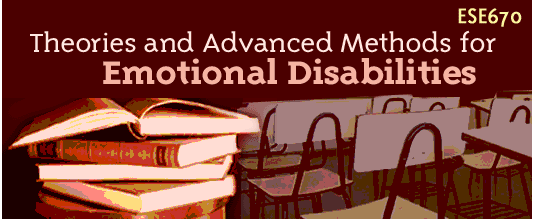
 |
|||||
| |
|
|
|
|
|
This first selection comes from The Council for Exceptional Children. Their code of professional conduct is a thorough document, detailing expectations of teachers who work in special education. This is just an excerpt
CEC Standards for Professional Practice Professionals in Relation to Persons with Exceptionalities and Their Families. http://www.cec.sped.org/ps/code.html#4
Special education personnel are committed to the application of professional expertise to ensure the provision of quality education for all individuals with exceptionalities. Professionals strive to:
Identify and use instructional methods and curricula that are appropriate to their area of professional practice and effective in meeting the individual needs of persons with exceptionalities.
Participate in the selection and use of appropriate instructional materials, equipment, supplies, and other resources needed in the effective practice of their profession.
Create safe and effective learning environments which contribute to fulfillment of needs, stimulation of learning, and self-concept.
Maintain class size and case loads which are conducive to meeting the individual instructional needs of individuals with exceptionalities.
Use assessment instruments and procedures that do not discriminate against persons with exceptionalities on the basis of race, color, creed, sex, national origin, age, political practices, family or social background, sexual orientation, or exceptionality.
Base grading, promotion, graduation, and/or movement out of the program on the individual goals and objectives for individuals with exceptionalities.
Provide accurate program data to administrators, colleagues, and parents, based on efficient and objective record keeping practices, for the purpose of decision making.
Maintain confidentiality of information except when information is released under specific conditions of written consent and statutory confidentiality requirements.
copyright © 1997 The Council for Exceptional Children
Last updated: July 24, 1997
This next section is the Family Educational Rights and Privacy Act (FERPA), and is also located on the Arizona Department of Education web site. It is required reading for teachers, given to parents at the beginning of each school year and a legal, as well as an ethic responsibility for educators.
Annual Notification to Parents Regarding
Confidentiality of Student Education Records
The Family Educational Rights and Privacy Act (FERPA) is a Federal law that protects the privacy of student education records. FERPA gives parents certain rights with respect to their children's education records. These rights transfer to the student when he or she reaches the age of 18 or attends a school beyond the high school level. Students to whom the rights have transferred are "eligible students."
Schools may disclose, without consent, "directory" information such as a student's name, address, telephone number, date and place of birth, honors and awards, sports participation (including height and weight of athletes) and dates of attendance unless notified by the parents or eligible student that the school is not to disclose the information without consent.
The Individuals with Disabilities Education Act (IDEA) is a federal law that protects the rights of students with disabilities. In addition to standard school records, for children with disabilities education records could include evaluation and testing materials, medical and health information, Individualized Education Programs and related notices and consents, progress reports, materials related to disciplinary actions, and mediation agreements. Such information is gathered from a number of sources, including the student's parents and staff of the school of attendance. Also, with parental permission, information may be gathered from additional pertinent sources, such as doctors and other health care providers. This information is collected to assure the child is identified, evaluated, and provided a Free Appropriate Public Education in accordance with state and federal special education laws.
Each agency participating under Part B of IDEA must assure that at all stages of gathering, storing, retaining and disclosing education records to third parties that it complies with the federal confidentiality laws. In addition, the destruction of any education records of a child with a disability must be in accordance with IDEA regulatory requirements.
For additional information or to file a complaint, you may call the federal government at (202) 260-3887 (voice) or 1-800-877-8339 (TDD) OR the Arizona Department of Education (ADE/ESS) at (602) 542-4013. Or you may contact:
Family Policy Compliance Office |
Arizona Department of Education Exceptional Student Services 1535 W. Jefferson, BIN 24 Phoenix , AZ 85007 |
This notice is available in English and Spanish on the ADE website at www.ade.az.gov/ess/resources under forms. For assistance in obtaining this notice in other languages, contact the ADE/ESS at the above phone/address.
![]()
Here are examples of the guiding principles in a social service agency, when taking a social history.
Individually-centered initial assessment engages the individual in a proactive way and
takes into consideration a person’s unique life experiences and circumstances. This
may include discussing successes and challenges in learning, work and personal
experiences. Initial assessment is flexible in order to address individual and cultural differences.
Guiding Principle 2: Respectful and Confidential
Initial assessment is conducted in a culturally sensitive, non-threatening manner that is
respectful of the individual and that ensures confidentiality.
Guiding Principle 3: Based on Many Relevant Sources of Information
A sound assessment process utilizes many relevant sources of information.
Guiding Principle 4: Holistic in Nature
The needs of individuals and their families are addressed holistically, recognizing the
interconnected nature of issues and their solutions. The needs and well-being of the
individual are considered in the context of the many family, cultural and community
relationships which nurture them.
http://www.learning.gov.sk.ca/branches/programs/pdf/pub_be_intake_assessment.pdf
Go to Activity One